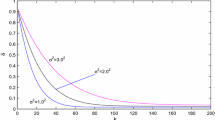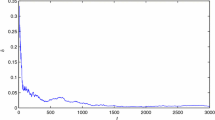Abstract
For bilinear systems with colored noise, this paper gives the input–output representation of the bilinear systems through eliminating the state variables in the model and derives a three-stage gradient-based iterative algorithm and a three-stage least-squares-based iterative algorithm for identifying the parameters of the input–output representation by means of the hierarchical identification principle. A gradient-based iterative (GI) algorithm is given for comparison. Compared with the GI algorithm, the proposed algorithms have lower computational burden and faster convergence speed. The simulation results indicate that the proposed algorithms are more effective for identifying bilinear systems.







Similar content being viewed by others
References
Wang, Y.J., Ding, F.: Recursive least squares algorithm and gradient algorithm for Hammerstein-Wiener systems using the data filtering. Nonlinear Dyn. 84(2), 1045–1053 (2016)
Ding, F., Liu, X.M., Liu, M.M.: The recursive least squares identification algorithm for a class of Wiener nonlinear systems. J. Frankl. Inst. 353(7), 1518–1526 (2016)
Xu, L.: A proportional differential control method for a time-delay system using the Taylor expansion approximation. Appl. Math. Comput. 236, 391–399 (2014)
Xu, L., Chen, L., Xiong, W.L.: Parameter estimation and controller design for dynamic systems from the step responses based on the Newton iteration. Nonlinear Dyn. 79(3), 2155–2163 (2015)
Xu, L.: Application of the Newton iteration algorithm to the parameter estimation for dynamical systems. J. Comput. Appl. Math. 288, 33–43 (2015)
Chaudhary, N.I., Raja, M.A.Z.: Identification of Hammerstein nonlinear ARMAX systems using nonlinear adaptive algorithms. Nonlinear Dyn. 79(2), 1385–1397 (2015)
Brewick, P.T., Masri, S.F.: An evaluation of data-driven identification strategies for complex nonlinear dynamic systems. Nonlinear Dyn. 85(2), 1297–1318 (2016)
Mao, Y.W., Ding, F.: A novel parameter separation based identification algorithm for Hammerstein systems. Appl. Math. Lett. 60, 21–27 (2016)
Mao, Y.W., Ding, F.: Multi-innovation stochastic gradient identification for Hammerstein controlled autoregressive autoregressive systems based on the filtering technique. Nonlinear Dyn. 79(3), 1745–1755 (2015)
Chai, J., Tian, B., Zhen, H.L., Sun, W.R.: Conservation laws, bilinear forms and solitons for a fifth-order nonlinear Schrödinger equation for the attosecond pulses in an optical fiber. Ann. Phys. 359, 371–384 (2015)
Ponce, Y.M., Torres, E.C., Jacas, C.R.G., Barigye, S.J., et al.: Novel 3D bio-macromolecular bilinear descriptors for protein science: predicting protein structural classes. J. Theor. Biol. 374, 125–137 (2015)
Christoskov, I.D., Petkov, P.T.: A practical procedure of bilinear weighted core kinetics parameters computation for the purpose of experimental reactivity determination. Ann. Nucl. Energy 29(9), 1041–1054 (2002)
Daniel-Berhe, S., Unbehauen, H.: Bilinear continuous-time systems identification via hartley-based modulating functions. Automatica 34(4), 499–503 (1998)
Kalouptsidis, N., Koukoulas, P., Mathews, V.J.: Blind identification of bilinear systems. IEEE Trans. Signal Process. 51(2), 484–499 (2003)
Verdult, V., Verhaegen, M.: Kernel methods for subspace identification of multivariable LPV and bilinear systems. Automatica 41(9), 1557–1565 (2005)
Gibson, S., Wills, A., Ninness, B.: Maximum-likelihood parameter estimation of bilinear systems. IEEE Trans. Autom. Control 50(10), 1581–1596 (2005)
Li, G.Q., Wen, C.Y., Zhang, A.M.: Fixed point iteration in identifying bilinear models. Syst. Control Lett. 83, 28–37 (2015)
Meng, D.D.: Recursive least squares and multi-innovation gradient estimation algorithms for bilinear stochastic systems. Circuits Syst. Signal Process. 36(3), 1052–1065 (2017)
Pan, J., Jiang, X., Wan, X.K., Ding, W.F.: A filtering based multi-innovation extended stochastic gradient algorithm for multivariable control systems. Int. J. Control Autom. Syst. (2017). doi:10.1007/s12555-016-0081-z
Ghadimi, E., Shames, I., Johansson, M.: Multi-step gradient methods for networked optimization. IEEE Trans. Signal Process. 61(21), 5417–5429 (2013)
Narendra, K.S., Parthasarathy, K.: Gradient methods for the optimization of dynamical systems containing neural networds. IEEE Trans. Neural Netw. 2(2), 252–262 (1991)
Ding, F., Xu, L., Zhu, Q.M.: Performance analysis of the generalised projection identification for time-varying systems. IET Control Theory Appl. 10(18), 2506–2514 (2016)
Xu, L., Ding, F.: The parameter estimation algorithms for dynamical response signals based on the multi-innovation theory and the hierarchical principle. IET Signal Process. (2017). doi:10.1049/iet-spr.2016.0220
Wang, Y.J., Ding, F.: Novel data filtering based parameter identification for multiple-input multiple-output systems using the auxiliary model. Automatica 71, 308–313 (2016)
Wang, Y.J., Ding, F.: The filtering based iterative identification for multivariable systems. IET Control Theory Appl. 10(8), 894–902 (2016)
Wang, Y.J., Ding, F.: The auxiliary model based hierarchical gradient algorithms and convergence analysis using the filtering technique. Signal Process. 128, 212–221 (2016)
Hu, Y.B., Liu, B.L., Zhou, Q.: A multi-innovation generalized extended stochastic gradient algorithm for output nonlinear autoregressive moving average systems. Appl. Math. Comput. 247, 218–224 (2014)
Mao, Y.W., Ding, F.: A novel data filtering based multi-innovation stochastic gradient algorithm for Hammerstein nonlinear systems. Digit. Signal Process. 46, 215–225 (2015)
Wan, X.K., Li, Y., Xia, C., Wu, M.H., Liang, J., Wang, N.: A T-wave alternans assessment method based on least squares curve fitting technique. Measurement 86, 93–100 (2016)
Xu, L., Ding, F.: Recursive least squares and multi-innovation stochastic gradient parameter estimation methods for signal modeling. Circuits Syst. Signal Process. 36(4), 1735–1753 (2017)
Wang, D.Q., Ding, F.: Parameter estimation algorithms for multivariable Hammerstein CARMA systems. Inf. Sci. 355, 237–248 (2016)
Wang, D.Q., Zhang, W.: Improved least squares identification algorithm for multivariable Hammerstein systems. J. Frankl. Inst. 352(11), 5292–5307 (2015)
Tai, C.T.: An iterative method of solving a system of linear equations and its physical interpretation from the point of view of scattering theory. IEEE Trans. Antennas Propag. 18(5), 713–714 (1970)
Feng, Y.T., Varga, A., Anderson, B.D.O., Lovera, M.: A new iterative algorithm to solve periodic Riccati differential equations with sign indefinite quadratic terms. IEEE Trans. Autom. Control 56(4), 929–934 (2011)
Abebe, A.T., Kang, C.G.: Iterative order recursive least square estimation for exploiting frame-wise sparsity in compressive sensing-based MTC. IEEE Commun. Lett. 20(5), 1018–1021 (2016)
Wang, F.F., Ding, F.: Gradient-based iterative identification methods for multivariate pseudo-linear moving average systems using the data filtering. Nonlinear Dyn. 84(4), 2003–2015 (2016)
Xu, L.: The damping iterative parameter identification method for dynamical systems based on the sine signal measurement. Signal Process. 120, 660–667 (2016)
Ding, F., Liu, X.M., Ma, X.Y.: Kalman state filtering based least squares iterative parameter estimation for observer canonical state space systems using decomposition. J. Comput. Appl. Math. 301, 135–143 (2016)
Schranz, C., Knöbel, C., Kretschmer, J., Zhao, Z., Möller, K.: Hierarchical parameter identification in models of respiratory mechanics. IEEE Trans. Biomed. Eng. 58(11), 3234–3241 (2011)
Wang, D.Q.: Hierarchical parameter estimation for a class of MIMO Hammerstein systems based on the reframed models. Appl. Math. Lett. 57, 13–19 (2016)
Dai, H., Sinha, N.K.: Robust recursive least-squares method with modified weights for bilinear system identification. IEE Proc. D Control Theory Appl. 136(3), 122–126 (1989)
Li, M.H., Liu, X.M., Ding, F.: The gradient based iterative estimation algorithms for bilinear systems with autoregressive noise. Circuits Syst. Signal Process. (2017). doi:10.1007/s00034-017-0527-4
Pan, J., Yang, X.H., Cai, H.F., Mu, B.X.: Image noise smoothing using a modified Kalman filter. Neurocomputing 173, 1625–1629 (2016)
Feng, L., Wu, M.H., Li, Q.X., et al.: Array factor forming for image reconstruction of one-dimensional nonuniform aperture synthesis radiometers. IEEE Geosci. Remote Sens. Lett. 13(2), 237–241 (2016)
Wang, T.Z., Qi, J., Xu, H., et al.: Fault diagnosis method based on FFT-RPCA-SVM for cascaded-multilevel inverter. ISA Trans. 60, 156–163 (2016)
Wang, T.Z., Wu, H., Ni, M.Q., et al.: An adaptive confidence limit for periodic non-steady conditions fault detection. Mech. Syst. Signal Process. 72–73, 328–345 (2016)
Acknowledgements
This work was supported by the National Natural Science Foundation of China (No. 61472195) and the Taishan Scholar Project Fund of Shandong Province of China.
Author information
Authors and Affiliations
Corresponding author
Rights and permissions
About this article
Cite this article
Li, M., Liu, X. & Ding, F. Least-squares-based iterative and gradient-based iterative estimation algorithms for bilinear systems. Nonlinear Dyn 89, 197–211 (2017). https://doi.org/10.1007/s11071-017-3445-x
Received:
Accepted:
Published:
Issue Date:
DOI: https://doi.org/10.1007/s11071-017-3445-x




